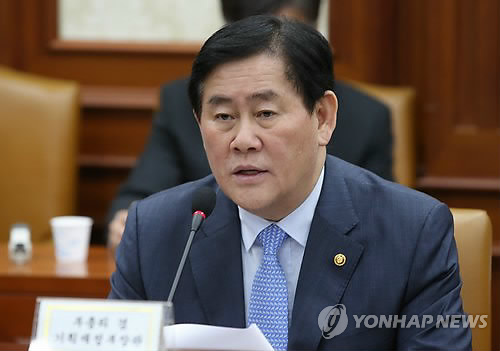The Finance Ministry plans to map out a guideline on dismissing employees at state-funded agencies or institutions with poor performance records, as part efforts to reform the public sector.
The policy is an extension of the government’s recent pledge to vitalize the scheme to lay off low-performing civil servants, which was introduced in 2006.
 |
Deputy Prime Minister and Minister of Strategy and Finance Choi Kyung-hwan. (Yonhap) |
Aside from the civil service, the government has decided to expand the stern disciplinary policy to quasi-civil servants at state-run agencies and public firms, said officials at the Finance Ministry on Monday.
An official said the dismissal targets would likely be those with poor performances for two consecutive years, adding the assessment standards would be unveiled later this year.
In the case of civil servants, a state sanctioning committee is entitled to determine the fate of those who are given the lowest yearly grade a second time, or those who received a one-time lowest grade and out-of-duty penalty of six months to a year.
The committee has the right to recommend ministers and the presidential office to lay off some poor performers.
But no civil servant has been deprived of their status in the nine years since the punitive policy was introduced in 2006.
For the success of the scheme, experts say the government will have to devise more concrete standards and implement the assessment on civil servants and quasi-civil servants in an impartial manner.
Skeptics question the efficacy of the current scheme and the planned one. They say that the lack of dismissals for poor performance over the past decade means that evaluators at each ministry could have glossed over problems with staff.
Meanwhile, unionized workers at public institutions denounced the policy.
“The public sector is different from the manufacturing industry in terms of business function. It would be impossible to set uniformed assessment codes for the public sector,” said a union leader.
If junior employees refused to follow unreasonable instructions from their seniors, who have the evaluation authority, the employees could be graded in an unfair manner, he said.
The government and the ruling Saenuri Party are considering expanding the scheme to the private sector in consultation with business lobbies.
But a tough backlash is expected in the private sector as well as in the public sector. The labor sector takes the position that the government is needlessly striving to find further legal grounds to fire workers, despite a variety of dismissal requirements stipulated by the Labor Standards Act.
By Kim Yon-se (
kys@heraldcorp.com)






![[Herald Interview] 'Trump will use tariffs as first line of defense for American manufacturing'](http://res.heraldm.com/phpwas/restmb_idxmake.php?idx=644&simg=/content/image/2024/11/26/20241126050017_0.jpg)
![[Health and care] Getting cancer young: Why cancer isn’t just an older person’s battle](http://res.heraldm.com/phpwas/restmb_idxmake.php?idx=644&simg=/content/image/2024/11/26/20241126050043_0.jpg)
